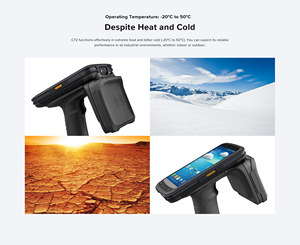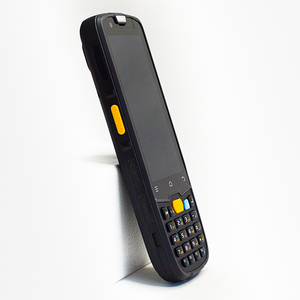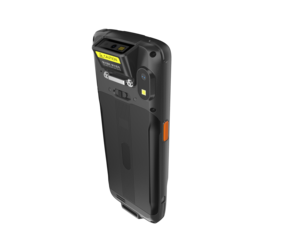(715 products available)





















































































































































































































The IP67 handheld QR code scanner can efficiently scan a QR code in varied industrial settings. Traceability and inventory management rely heavily on it. The codex blades and readers for QR codes are handheld devices that come with a stable and strong exterior. This allows them to resist harsh conditions. The sign IP67 means that the device is dustproof and can endure one meter to six meters of submersion in water. This kind of scanner can be used in industries like logistics, manufacturing, and construction where exposure to water/dust elements is likely to occur.
A barcode scanner for an IP67 rating has many features. They can include a camera for taking pictures or videos, a touch screen for giving real-time feedback, a data communication capability for Bluetooth or wireless connection, a GPS for tracking location, and fingerprint login for secure access.
The IP67 handheld QR code scanner comes in various types depending on the scanning technology.
Scanning Technology:
The scanning engine of an IP67 scanner can read and decode various types of 2D barcode, such as QR codes, fast and reliably. QR codes are 2D barcodes that can hold more information than a 1D barcode. They are used in many industries like transport, retail, and healthcare to track items and assets accurately. A handheld QR code scanner may use a laser, CCD, or CMOS sensor to read QR codes on the screen or surface of a product and convert the scan into digital data that can be transferred to a computer. The scanning engine of some models can read codes from up to 2 meters away, making them ideal for quality checks and information retrieval.
Connectivity Options:
Connectivity options include Bluetooth, WLAN, and USB. Bluetooth handheld scanners connect wirelessly to a smartphone or computer. They are useful for scanning items in places with no Wi-Fi. Some wireless QR code scanners have a wide area network (WLAN) that supports 2.4G and 5G connections. It transfers scanned data to mobile devices or computers instantly. WLAN can also be used to send updates about the scanner's working status or battery life. A wired scanner with USB connectivity can transfer data whenever it is plugged into a device. It is beneficial in areas with poor network connections.
Long-lasting Battery:
Handheld barcode scanners need batteries that can last a long time on a single charge. Models with 2000 mAh to 10000 mAh batteries can take up to 20 hours of continuous use. They come with a smart power management system that conserves power. Some scanners have a low battery warning system to alert users to recharge it. The batteries can be recharged using a cradle or through a type-C USB port.
Large Storage Memory:
The Qcode scanner has sufficient memory storage to hold scanned data before transferring it to a computer. A handheld QR code scanner with 32 MB to 64 MB of memory can store large amounts of data from barcodes and QR codes. This ensures no data is lost, even when the network connection is poor. The scanner's memory card can be upgraded easily to increase data storage capacity.
The IP67 handheld QR code scanner provides efficient scanning for various industries, even in challenging environments. Its rugged build and reliable performance empower workers in numerous applications.
Whether looking for an IP67 QR code scanner for retail or warehouse applications, buyers should know their needs and determine a budget. Here are some important things to consider when selecting an IP67-rated handheld QR code scanner:
Environment
The application environment is an important factor to consider when choosing a scanner. Since the IP67 rating protects against dust and water, these scanners are suitable for use in outdoor environments, factories, warehouses, and other areas prone to exposure. If the scanner will be used in outdoor environments, direct sunlight exposure is something to consider. In this case, choosing a scanner with an excellent light penetration performance will ensure efficient operation even under bright light conditions.
Scanning speed and precision
If high scanning speed and accuracy are required for the application, then it is important to consider choosing a laser or image-based scanner that can meet the operation's demands. Handheld QR code scanners with better decoding capabilities can quickly and accurately decode QR codes.
Connectivity and Range
For operations requiring a long scanning range, choosing a scanner with good Bluetooth technology is beneficial. If the scanner will be used in areas with poor or no Wi-Fi connectivity, it is wise to choose a pen-style scanner that can store decoded QR codes in its internal memory and transfer them to a PC via a wired connection.
Battery capacity
The operational battery life depends on the type of battery capacity. Choosing a scanner with a larger capacity battery can help reduce the frequency of charging and allow uninterrupted operation. In addition, considering the type of battery used in the scanner is important. Scanners using lithium batteries are more convenient to charge because they can be charged at any time during mobile operations.
After-sales support
When purchasing multiple units, after-sales support is an important consideration to ensure any issues can be resolved quickly. Some suppliers offer technical support to help their users choose the most suitable QR code scanner for their application.
Q1: Can the IP67 scanner connect to a computer or mobile device?
A1: Yes. The scanner can connect to devices via USB, Bluetooth, or Wi-Fi.
Q2: How long does the battery last before it needs replacement?
A2: The battery life depends on the model and usage. Scanners with rechargeable batteries allow users to complete multiple scans before recharging.
Q3: What type of software is needed to view the scanned data?
A3: Some models have built-in display screens to view the information. Users may also need decoding software on a PC to see the data in QR codes.
Q4: Can the scanner scan codes that are damaged or warped?
A4: Yes. Some advanced models can read QR codes that are partially damaged or distorted.